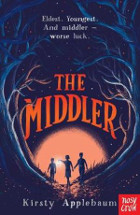The middler by Kirsty Applebaum

Nosy Crow books, 2019. ISBN: 9781788003452.
(Age: 12-14) Recommended. Themes: Dystopian fiction, Future society,
Friendship, Loyalty, Siblings, Betrayal. Maggie is looking for a way
to make herself noticed. She is a middle child, not a heroic eldest,
who will help to fight in the silent war to help her society. When
you turn 14 you go to camp and then to fight, it is a tradition that
no-one questions. But Maggie is not an eldest and laments the fact
that she is often forgotten even by her own family, so finding and
catching a Wanderer seems the best and most noble thing she can
manage to change that. Maggie and all the other townsfolk are
indoctrinated during their schooling to believe that the boundary of
the town is there to keep them safe from the outside world and the
wanderers - dirty, deceitful, dangerous people that don't have a
town to call home. So why does the one that Maggie has met seem so
nice and friendly? Una and her father are certainly dirty but are
they dangerous? She has connected with them and she feels compelled
to help. Una's father is badly injured, her mother is dead, so
Maggie gets the medicine they need and gives them food. She tells
herself that she will turn them in but when this happens facts are
revealed that make her question everything she has ever been told
about her society.
Maggie narrates the story, telling us about her family in such
detail that we get to know them well: her eldest brother Jed, about
to leave for Camp; her youngest brother Trig, who is special and
needs extra care; her hard-working mother and father; a family
living in the 20th century but at a time when the war has meant life
is a struggle and they don't always have the things they need to
live an easy life.
This book allows us to see that everyone has a different point of
view and putting yourself in another's shoes often reveals the truth
about life instead of the beliefs and prejudices that surround us.
The story could link with discussions about refugees and how their
lives are affected by the way society views their situation and life
choices.
Gabrielle Anderson